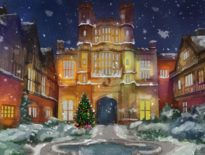On this day in Tudor history, 17th November 1558, twenty-five-year-old Elizabeth, daughter of King Henry VIII and Anne Boleyn, became Queen Elizabeth I following the death of her half-sister, Queen Mary I.
In today's talk, I look at an alternative account of Elizabeth I's words on her accession, one recorded by her godson, Sir John Harington. Hear Elizabeth I's wonderful speech, which she used to motivate her supporters and to reassure those who'd served Mary I.
I also look at Elizabeth's words "This is the Lord's doing...", and note the importance of the previous line in the Psalm.
Last year's video on Accession Day, 17th November 1558, can be viewed here:
Also on this day in history:
- 1493 – Birth of John Neville, 3rd Baron Latimer. He was the eldest son of Richard Neville, 2nd Baron Latimer, and his wife, Anne (née Stafford), and he was the brother of the poet William Neville. Latimer was married three times: Dorothy de Vere, sister of John de Vere, 14th Earl of Oxford; Elizabeth Musgrave, daughter of Sir Edward Musgrave; and Catherine Parr (the future Queen Catherine Parr), daughter of Sir Thomas Parr of Kendal and the widow of Edward Borough. Latimer died in March 1543 and his widow, Catherine Parr, married Henry VIII in July 1543.
- 1525 – Death of Sir John Fyneux, Judge and Chief Justice of the King's Bench. He was appointed Chief Justice in 1495, and was also an executor of Henry VII's will.
- 1551 – Death of Richard Fermor, wool merchant, at Easton Neston. He was buried at the parish church there. Fermor was one of the jurors at the trial of Sir Richard Empson, and purchased the manor of Easton Neston from Empson's family. He was imprisoned at Marshalsea prison in May 1540 for misprision of treason, for supporting his Catholic chaplain who was vocal in his support of the Pope as head of the Church, but was released in August 1540 and pardoned in 1541.
- 1558 – Death of Cardinal Reginald Pole, Mary I's Archbishop of Canterbury, at Lambeth Palace in London. He had been ill since September 1558 and died after hearing news of Mary I's death. He lay in state at the palace for forty days before being buried at Becket's Corona in Canterbury Cathedral.
- 1571 – Death of Sir Thomas Leigh, Lord Mayor of London. He was buried in the Mercer's Chapel. As Lord Mayor at the time of Elizabeth I's accession and coronation, he led Elizabeth's coronation procession.
- 1584 – Death of William Ayloffe, Justice of the Queen's Bench.
- 1589 – Death of Valentine Dale, member of Parliament, civil lawyer and diplomat, in the parish of St Gregory by Paul's in London. He was buried in the parish church there. Dale was sent on embassies to Flanders in 1563 and to Alexander Farnese, Duke of Parma, in 1588. He was on the commission which indicted Anthony Babington, and was also present at the trial of Mary, Queen of Scots. After Mary's trial, he wrote a memorandum justifying Mary's execution, at the behest of William Cecil, Lord Burghley.
Transcript:
On this day in Tudor history, 17th November 1558, twenty-five-year-old Elizabeth, daughter of King Henry VIII and Anne Boleyn, became Queen Elizabeth I following the death of her half-sister, Queen Mary I.
In last year’s video, I shared Sir Robert Naunton’s rather romanticised account of Elizabeth finding out she was queen, and how she fell to knees and, “after a good time of respiration”, uttered part of Psalm 18, the Latin verse translating to “this is the Lord's doing; it is marvellous in our eyes”. I’ll give you a link to that video in the description, but today I wanted to share an alternative reaction, a speech recorded by Elizabeth I’s godson, Sir John Harington, who described it as “Words spoken by the Queene to the Lordes, at her Accession, 1558”.
It is not clear whether she spoke these words on 17th November or when she spoke to the House of Lords on 20th November, but Elizabeth’s biographer, David Starkey, notes that this speech makes no sense if it's dated to 20th November, saying “spoken, however, three days earlier, in the fading light of her accession day, it becomes a thing of purpose. It addresses Elizabeth's own immediate concerns in the hours following her sister's death. And it addresses, still more pointedly, the concerns of her audience of ex-Marian councillors, most of whom were 'extremely frightened of what Madame Elizabeth will do with them'.” quoting the ambassador, Feria there.
Whether it was spoken on 17th, when Elizabeth found out she was queen, or three days later, it is a wonderful speech, so I’ll share it with you:
“My lords, the law of nature moveth me to sorrow for my sister; the burden that is fallen upon me maketh me amazed; and yet, considering I am God’s creature, ordained to obey His appointment, I will thereto yield, desiring from the bottom of my heart that I may have assistance of His grace to be the minister of His heavenly will in this office now committed to me.
And as I am but one body naturally considered, though by His permission a body politic to govern, so I shall desire you all, my lords (chiefly you of the nobility, everyone in his degree and power), to be assistant to me, that I with my ruling and you with your service may make a good account to almighty God and leave some comfort to our posterity in earth. I mean to direct all my actions by good advice and counsel.
And therefore, considering that divers of you be of the ancient nobility, having your beginnings and estates of my progenitors, kings of this realm, and thereby ought in honour to have the more natural care for maintaining of my estate and this commonwealth; some others have been of long experience in governance and enabled by my father of noble memory, my brother, and my late sister to bear office; the rest of you being upon special trust lately called to her service only and trust, for your service considered and rewarded; my meaning is to require of you all nothing more but faithful hearts in such service as from time to time shall be in your powers towards the preservation of me and this commonwealth.
And for council and advice I shall accept you of my nobility, and such others of you the rest as in consultation I shall think meet and shortly appoint, to the which also, with their advice, I will join to their aid, and for ease of their burden, others meet for my service. And they which I shall not appoint, let them not think the same for any disability in them, but for that I do consider a multitude doth make rather discord and confusion than good counsel. And of my goodwill you shall not doubt, using yourselves as appertaineth to good and loving subjects.”
Like her father and siblings, she had a way with words!
I do love the oak tree tradition though and I love that scene in the movie with Cate Blanchett when Elizabeth is sitting under the oak tree in the parkland of Hatfield when the lords come to tell her of her accession. It’s so dramatic and moving. And what I find interesting about Elizabeth’s use of the verse from Psalm 118, a psalm of thanksgiving to God for his goodness and mercy, is the previous line. The psalm reads:
“The stone which the builders refused is become the head stone of the corner.
This is the LORD'S doing; it is marvellous in our eyes.
This is the day which the LORD hath made; we will rejoice and be glad in it.”
Was Elizabeth seeing herself as the stone that her father and brother refused, a daughter who had been made illegitimate, a daughter and sister who was removed from the succession, a bastard, but who became the headstone of the corner, who became important, who became queen? I think so, but then I’m quite the romantic!
Elizabeth reigned until her death on 24th March 1603. Her achievements as queen included defeating the Spanish Armada and turning England into a strong and dominant naval power, expanding England overseas through colonisation, and founding the Church of England through her religious settlement. She was also a patron of Science and the Arts. Her reign is known for its Golden Age, but it was far from that for some of her Catholic subjects and those of her people living in poverty.



Leave a Reply